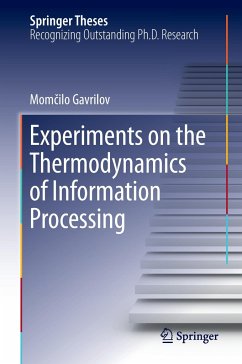This thesis reveals how the feedback trap technique, developed to trap small objects for biophysical measurement, could be adapted for the quantitative study of the thermodynamic properties of small systems. The experiments in this thesis are related to Maxwell's demon, a hypothetical intelligent, "neat fingered" being that uses information to extract work from heat, apparently creating a perpetual-motion machine.
The second law of thermodynamics should make that impossible, but how? That question has stymied physicists and provoked debate for a century and a half. The experiments in this thesis confirm a hypothesis proposed by Rolf Landauer over fifty years ago: that Maxwell's demon would need to erase information, and that erasing information-resetting the measuring device to a standard starting state-requires dissipating as much energy as is gained.
For his thesis work, the author used a "feedback trap" to study the motion of colloidal particles in "v
irtual potentials" that may be manipulated arbitrarily. The feedback trap confines a freely diffusing particle in liquid by periodically measuring its position and applying an electric field to move it back to the origin.
The second law of thermodynamics should make that impossible, but how? That question has stymied physicists and provoked debate for a century and a half. The experiments in this thesis confirm a hypothesis proposed by Rolf Landauer over fifty years ago: that Maxwell's demon would need to erase information, and that erasing information-resetting the measuring device to a standard starting state-requires dissipating as much energy as is gained.
For his thesis work, the author used a "feedback trap" to study the motion of colloidal particles in "v
irtual potentials" that may be manipulated arbitrarily. The feedback trap confines a freely diffusing particle in liquid by periodically measuring its position and applying an electric field to move it back to the origin.








